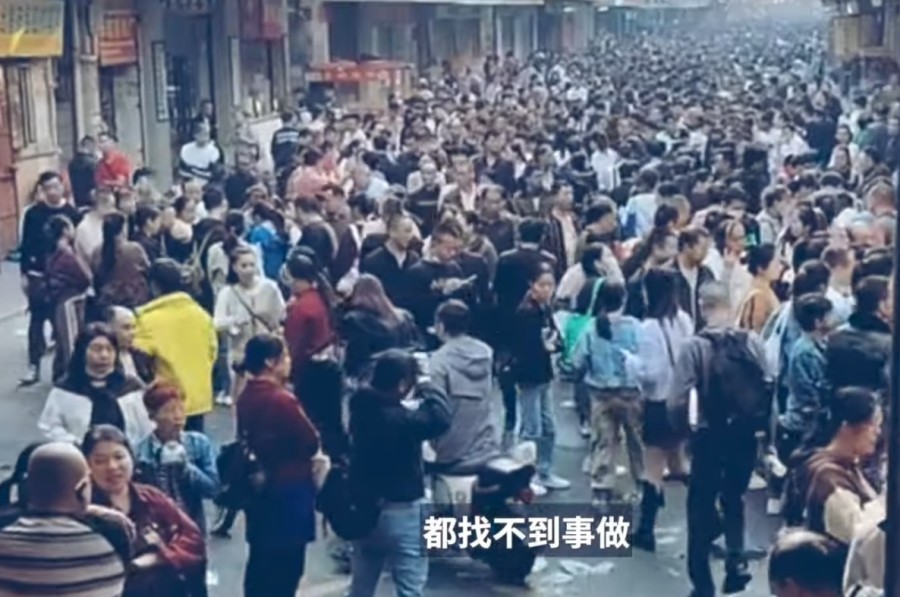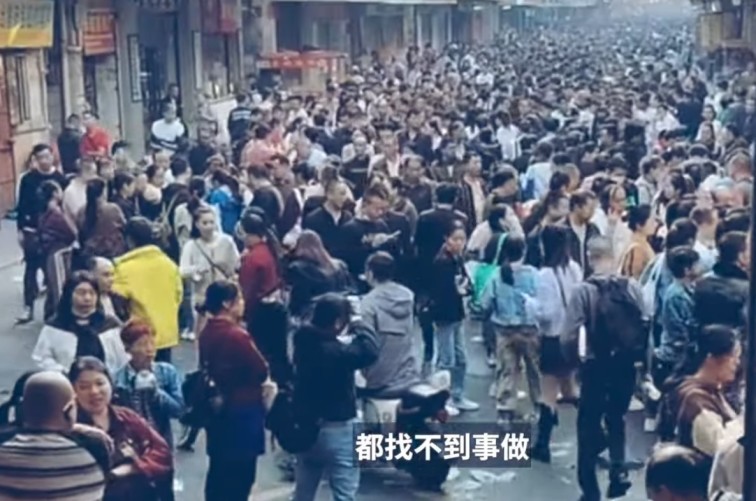This is a labour market in Guangzhou, where unemployment is rising. Many people are even pleading: "As long as there’s food to eat, it’s enough." (Screenshot from video)
[People News] China's economy is on the decline, yet in recent years, the government continues to claim a 5% annual GDP growth rate, raising widespread suspicions of data inflation. The National Bureau of Statistics of the Chinese Communist Party (CCP) recently disclosed that seven provinces and cities, including Jiangsu and Zhejiang, are involved in falsifying statistics.
According to multiple media reports, since late November last year, the National Bureau of Statistics formed 10 inspection teams to conduct routine statistical supervision in seven provinces—Shanxi, Liaoning, Jiangsu, Zhejiang, Hainan, Chongqing, and Ningxia—as well as three central government departments: the Ministry of Science and Technology, the State Administration for Market Regulation, and the National Administration of Financial Regulation.
The inspection teams reported that “some enterprises (projects) had inaccurate statistical data.” Interference in statistical work was reported in Zhejiang, Liaoning, Chongqing, and Shanxi. Jiangsu was the worst offender, with findings stating that “certain regions still interfere with data reporting, instruct or compel survey respondents to provide false data, and other such issues.”
In January, Jiangsu’s provincial government and statistical authorities held a press conference claiming that, based on official calculations, “Jiangsu's GDP in 2024 reached 13.7008 trillion yuan, ranking second nationwide. At constant prices, it grew by 5.8% year-on-year, with the largest increase nationwide.” This sparked hot discussions such as “Jiangsu surpasses Guangdong” and “Guangdong may lose its position as China's top economic province.”
The CCP's Fabricated Growth Narrative
Chinese economist Cheng Xiaonong, who has a background in planned statistics, told Radio Free Asia that this year, not just Jiangsu and Zhejiang, but virtually all provinces have reported inflated economic data. Otherwise, with so many businesses closing and industrial operations paralysed, the economy would likely be in negative growth. For the government to still claim 5% GDP growth is simply outrageous.
“If the National Bureau of Statistics were really falsifying data to this extent, its director would have to face trial,” Cheng said. “That’s why both central and local governments are coordinating to embellish the numbers. Targeting Jiangsu and Zhejiang may be the central government's way of warning other regions. Additionally, local governments want higher tax revenues and must therefore fabricate economic growth, because if the GDP were actually shrinking, tax revenue shouldn’t be increasing.”
Experts Question Credibility of China’s Official Statistics
Keith Naughton, co-founder of Silent Majority Strategies, wrote in The Hill that for at least the past decade, China’s economic growth narrative has been nothing more than a propaganda triumph, revealing the laziness and gullibility of Western media and institutions. Whether it's GDP, economic growth, deflation, or population data, China’s official statistics are a “tofu-dreg edifice” (i.e., shoddy and hollow), hiding serious underlying social issues.
In January last year, Henan revised its previous year’s GDP downward by more than 310 billion yuan, changing the growth rate from a 3.6% contraction to a 4.1% increase. According to the BBC, Fujian also adjusted its 2022 data downward, making its 2023 growth appear to jump from 2.3% to 4.5%. Similar data “revisions” happened in Jiangxi and Hunan, where post-adjustment growth rates effectively doubled.
Central Targets, Local Lies: “Mission Must Be Accomplished”
Lai Rongwei, Executive Director of the Taiwan Motivation Association, told Radio Free Asia that the CCP is a dictatorship governed by pressure and lacks a sound system for public oversight. Under this high-pressure structure, all party and government departments face enormous stress—officials must fulfil their assigned tasks or risk political ruin, personal hardship, or even family instability. “In difficult economic times, absurd practices and illogical data will inevitably emerge, even with different departments releasing contradictory statistics,” Lai noted.
At the local level, Lai explained, grassroots officials face enormous pressure to meet the central government's 5% growth target. These cadres are often rotated every two to three years, and without impressive performance records, promotions are difficult. To survive and advance, they build networks and mutually inflate achievements. “When the central government issues orders, localities will do everything they can to create data. For instance, with high unemployment, local officials may fabricate improvements by sending youth to short-term jobs or volunteer programs to make unemployment numbers look better and stable.”
Can the Centre's Crackdown Restore Credibility?
Cheng Xiaonong noted that with China’s economy deteriorating, most provinces now can’t compete with one another by “boasting better” results, and have resorted to “boasting less bad.” For local officials, it’s become routine: the centre wants 5% GDP growth, so they report 5%.
“This falsification issue isn't new—it happened last year and the year before too,” Cheng said. “The central government is fully aware of the rampant fraud but won’t admit it openly, because doing so would mean acknowledging that the entire national statistical system is untrustworthy, placing the National Bureau of Statistics in a credibility crisis.” “The Bureau also can’t admit that it pressures lower units for data, or the international community will question its credibility. So the central government denies the existence of data falsification pressure while selectively punishing a few regions as a show to address international doubts.”
False Data Misleads Policy Decisions
An editorial from The Paper (Pengpai News) pointed out that statistics are the "barometer" of the economy and society, and a "compass" for scientific policymaking—authenticity is the lifeblood of statistical work. Once data falsification occurs, it may mislead macro-level decisions, damage government credibility, and foster a toxic environment of competing lies, with serious consequences.
Lai Rongwei emphasised that the central government, misled by “beautified” data, may wrongly believe the country is developing well, leading to overestimations in international trade negotiations. Obsessed with appearances and reluctant to face reality, the ultimate victims are the Chinese people.
(Source: Radio Free Asia)











News magazine bootstrap themes!
I like this themes, fast loading and look profesional
Thank you Carlos!
You're welcome!
Please support me with give positive rating!
Yes Sure!